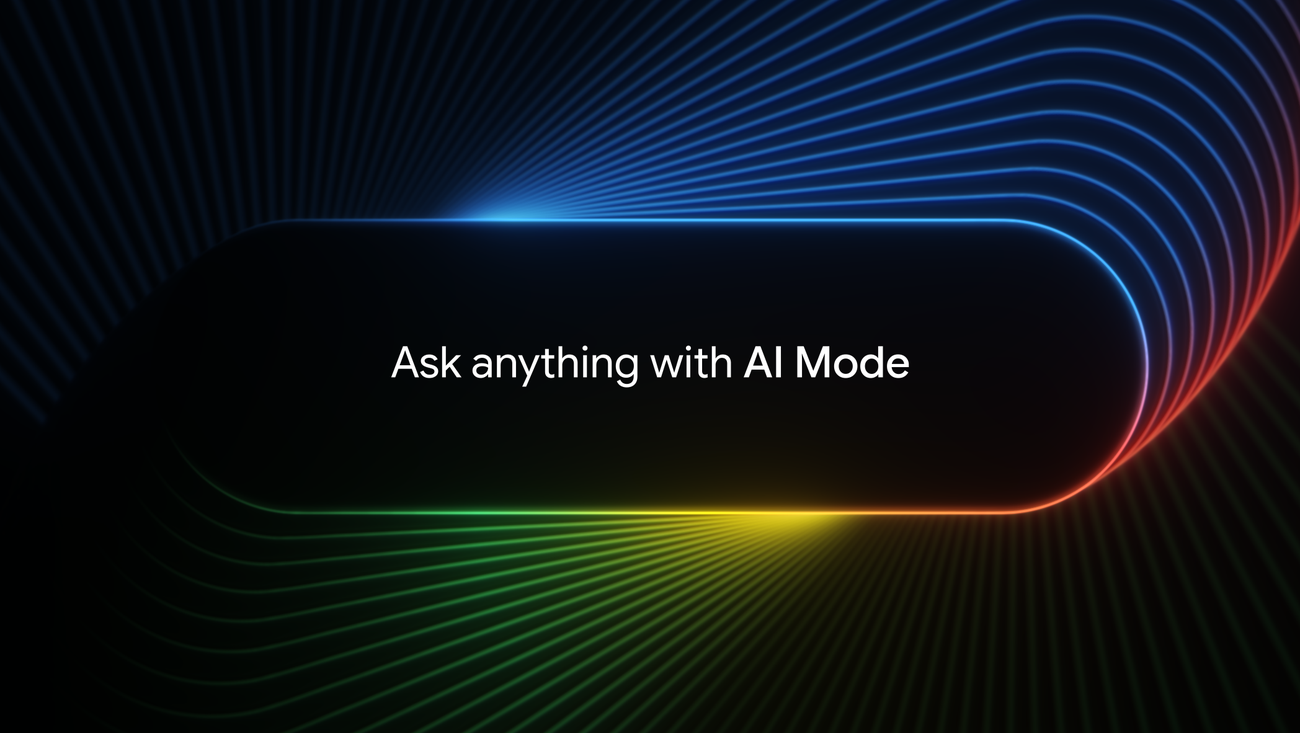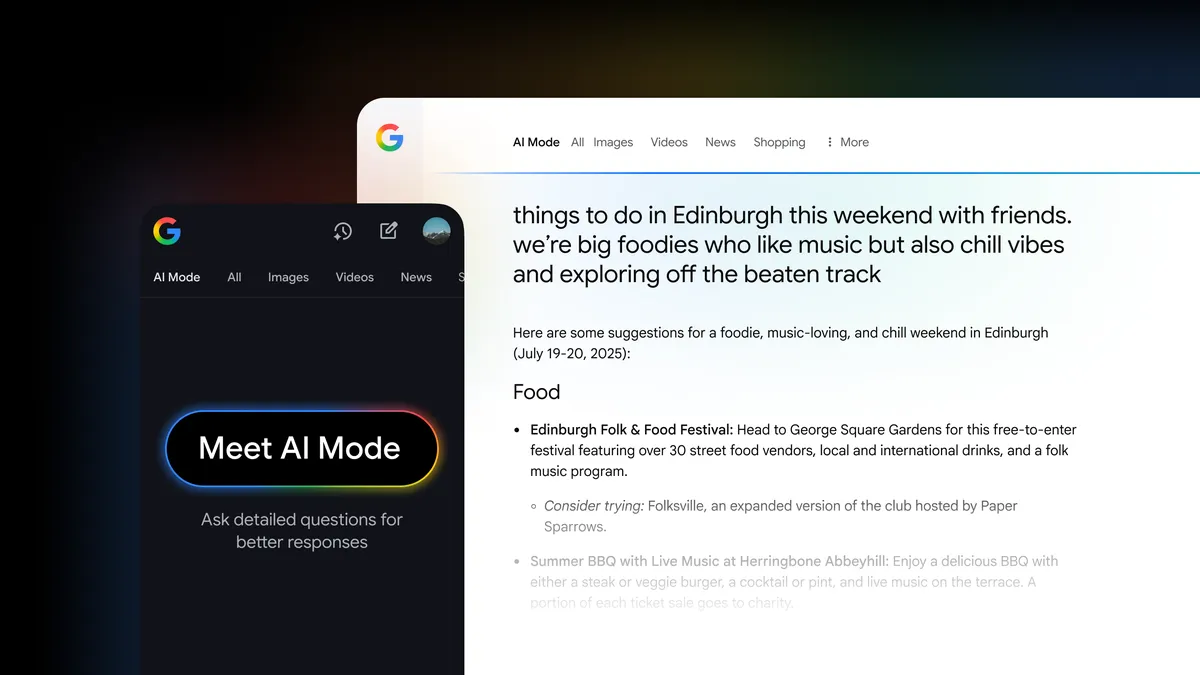Google has officially rolled out AI Mode in the UK, as of July 28th 2025, following its earlier launch in the United States and India. This new search experience is powered by Google’s Gemini 2.5 model, delivering synthesised responses to create a richer, more conversational experience.
Particularly useful for exploratory questions, it can handle multi-part queries as AI Mode will retain context from previous prompts. Marking a major shift from traditional search, this update introduces a new way for people to explore the web and for brands this will reshape how visibility, authority and click-throughs are earned online.
So, what does this mean for the future of search?

What you need to know about Google AI Mode:
· Query fan out: Google AI Mode uses a customised version of Gemini (Google’s AI model), and a ‘query fan-out’ technique to run several searches at once and then provide a synthesised response. Users can also ask follow-up questions, and with AI Mode having the ability to retain context from previous prompts this enables a more flexible and intuitive way to search.
· Multi-modal search: Users aren’t limited to text. With AI Mode, users can ask questions using text, voice or images and receive answers in a range of formats.
· AI-powered actions: Beyond answering questions, AI Mode can also complete tasks including booking transport, contacting local businesses and making reservations – turning search into action.
· Ad integration: Ads are already live on desktop, with plans to expand across all devices later this year.
· Early results: Since launching in the US and India, Google has reported that AI Mode now accounts for 1.25% of total search sessions and that sessions are 38% longer compared to traditional search. Over 80 million users have already interacted with AI Mode, and there are plans in place for AI Mode to be translated into 20+ languages by the end of 2025.

Why does AI Mode matter for SEO?
AI Mode isn’t just a new look for search – it’s changing the way we strategise and optimise for SEO. Impacting how content is discovered and how authority is determined, AI Mode ultimately will impact how users engage with results. Ranking on page one is no longer enough – you need to be the source that AI models choose to cite.
So, what does that mean for your SEO strategy?
Clicks are declining
One of the biggest shifts brands will likely see is a loss in initial traffic, as zero-click searches rise. Because AI responses answer the query directly, there will be many occasions where users no longer need to click through to a website.
Measurement is changing
AI Mode data isn’t currently available in Google Search Console or Google Analytics, marking a clear departure from traditional search reporting.
Taking a multi-modal approach
With users now being able to search using text, voice and visuals – brands must now optimise assets across all formats. To enable crawling and indexing, content must also meet Google’s technical standards to ensure AI readability.
Citations are the new gold standard
Traditional rankings are no longer all that matters. Visibility is now more important than ever, because if your content isn’t referenced in AI summaries then you’re less likely to be seen.
The ecosystem is fragmenting
Google is losing ground as the most important player in search. With tools like ChatGPT redefining how users find and interact with information, brands are being forced to rethink their strategies beyond traditional SEO. Content needs to be discoverable across a range of growing platforms – not just Google.
Your brands digital footprint is everything
AI Mode, as with other AI models, pulls information from trusted sources – meaning that your content, press mentions and structured data all contribute to whether (and how) your brand is featured in AI answers.
Preparing for AI Mode: What should brands do next?
AI Mode is reshaping how users search - meaning brands need to rethink their approach. Starting with how success is measured, how content is optimised and how ads are tested.
Measurement
We can assume that AI Mode will likely impact traditional website traffic, meaning fewer clicks as AI answers queries more directly. Whilst AI Mode-specific reporting isn’t available yet, you can filter Google Search Console data for longer queries (10+ characters). These longer prompts are likely to indicate conversational AI prompts, meaning brands can monitor emerging search behaviours.
Optimisation
Multi-modal content (including images, video and text) must be fully optimised and accessible to Google’s crawlers. Meeting Google’s technical requirements will be fundamental to ensuring that your brand is indexed and eligible to appear in AI-powered results. Use a ‘query fan-out’ mindset to expand keyword research and content planning, anticipating the range of conversational prompts that users might be directed to employ.
Experimentation
We’re collaborating closely with our US teams across the dentsu network to gather insights from the rollout of ads within AI Overviews. It will be essential to prepare your content for AI-driven ad formats as they become available. Testing performance across Performance Max (Pmax) and AI Mode-specific (AI Max) campaigns will enable brands how to understand how Google’s evolving AI impacts paid media.
Though the full impact of AI Mode is still unfolding, one thing is evident – user behaviour is shifting towards longer, more conversational queries to reflect how people naturally speak and think. While zero-click searches might be increasing, the clicks you gain will inevitably be more valuable as they will be coming from users who are further along in their decision-making journey.
Now is the time for brands to revisit their SEO and content strategies. Prioritising multi-modal and user-first content formats will be crucial to staying competitive. Visibility will become a key performance metric and brands that optimise their technical foundations, assets and strategies will be best positioned to lead.
If you’d like to discuss how to future-proof your brand in this new search landscape, don’t hesitate to get in touch.
 (Logo).jpg)
